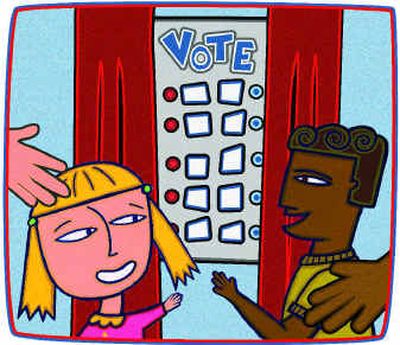The KID vote

Should you involve your children in the political process this election season? Yes.
“Parents who talk with their kids about politics, take their kids to vote, and vote in all or most elections also tend to raise kids with higher levels of political knowledge and more attentiveness to political news in the media,” according to the nonpartisan, nonprofit Council for Excellence in Government. Former Presidents Carter, Ford, Bush and Clinton are honorary chairs of the council.
But how do you involve kids? They ask tough questions, and democracy is a messy and complicated process.
Just as there are no easy answers, there is no wrong way. Plunge in.
“If you don’t have all the answers, that’s OK,” says Carl Fillichio, vice president of the council. “Make this a starting point for talking about government and discover things together.”
Below are plenty of tools, suggestions and resources from the council’s Take Your Kids to Vote! Program.
Involving your kids in the political process
• Choose an issue that affects them: Find one that affects your kids directly — the environment or education, for example — then follow it through the media, keeping track of what is said and by whom. Talk to your children about which candidate reflects your views.
• Contact the candidates: Encourage your child to write a letter or an e-mail to a candidate. Contact information for specific candidates can be found at www.vote-smart.org.
• Take a walk around the neighborhood: After dinner, take your family for a stroll through the neighborhood and note all the political advertising that you see. How many different campaigns can your kids identify?
• Review the ads: Which slogans and messages are the candidates communicating in their advertising? Ask your kids about the ads — are they negative, warm and fuzzy, humorous or scary? Which type of ads do they remember best and why?
• Listen up: Have your kids talk to older members of the family about their voting histories. Who was the first presidential candidate they voted for? Who were their all-time favorite candidates, and did they win or lose?
• Go to the polls with your kids: Customize a personal ballot for your kids to mark with the most important contests included.
• Watch the returns: On Election Day, watch television, paying attention to close races for Congress to see which political party will hold the majority in each chamber. Talk to your kids about what the results of local elections will mean for your family.
Web resources for families
• www.vote-smart.org: Project Vote Smart has issue-oriented candidate info and youth voting surveys. This is an excellent site for understanding candidates’ positions on issues.
• www.rockthevote.org: Rock the Vote’s site has teen-friendly info with exciting graphics, designed to get out the vote among young people.
• http://bensguide.gpo.gov: Ben Franklin’s Government Guide for Kids gives the basics on how our government works.